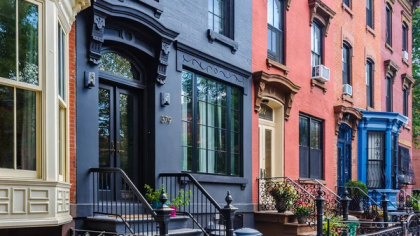Renting a new place can be an exciting adventure, but before you start picturing your future life in a chic downtown apartment or a cozy suburban home, there’s a little thing called a security deposit that you’ll need to deal with.
Don’t let this part of the rental process get you down. With the right knowledge, you can handle it like a pro.
This guide breaks down everything you need to know about security deposits, from how much you should expect to pay, to what happens when you move out.
Quick Summary
A security deposit is a crucial part of renting a home, serving as a financial safety net for landlords against potential damages or unpaid rent.
Typically equivalent to one to two months’ rent, the amount can vary based on factors like property condition and tenant profile.
State and local regulations govern the management and return of deposits, with specific timelines and requirements for landlords.
When moving out, ensure the property is clean, document its condition, and return keys to maximize the chance of getting your deposit back.
Common disputes involve deductions for damage or cleaning, which can often be resolved through communication or mediation.
Alternatives like security deposit insurance or surety bonds may offer lower upfront costs.
To safeguard your deposit, inspect the property before moving in, maintain it well during your tenancy, and prepare thoroughly before moving out.
Understanding Security Deposits
What is a Security Deposit?
A security deposit is a sum of money that you pay to your landlord or property manager before moving into a rental property.
Its primary purpose is to protect the landlord from financial loss due to potential damage to the property, unpaid rent, or other breaches of the lease agreement.
Think of it as a financial safety net for the landlord.
Why Are Security Deposits Required?
Security deposits serve multiple purposes:
- Property Protection: Covers potential damage to the property beyond normal wear and tear.
- Rent Assurance: Ensures that the landlord can recover unpaid rent if you leave without settling your dues.
- Lease Compliance: Acts as a deterrent against breaking the lease or failing to meet other obligations.
Legal Requirements and Regulations
State and Local Laws
The amount and management of security deposits are regulated by state and local laws, which vary significantly across regions.
Here’s a brief overview:
- Maximum Amount: Most states cap the amount of the security deposit at one to two months’ rent.
- Interest on Deposits: Some states require landlords to pay interest on security deposits.
- Return Deadlines: Laws often specify how long landlords have to return your deposit after you move out, typically 30 days.
Landlord Responsibilities
Landlords have specific duties concerning security deposits:
- Written Receipts: Must provide a written receipt of the deposit payment.
- Detailed Accounting: Should give a detailed list of any deductions made from the deposit.
- Proper Handling: Must place the deposit in a separate account or a specific type of financial instrument, as required by local laws.
Determining the Amount of the Security Deposit
Typical Deposit Amounts
The amount of a security deposit is usually calculated based on the monthly rent:
- Standard Practice: Most landlords require one month’s rent as a security deposit.
- Higher Deposits: In high-demand rental markets or for high-end properties, the deposit could be equivalent to two months’ rent or more.
Factors Influencing Deposit Amount
Several factors can affect the amount of the security deposit:
- Credit History: A lower credit score may result in a higher deposit requirement.
- Pet Ownership: If you have pets, landlords may require an additional pet deposit.
- Property Type: Higher deposits might be requested for luxury or furnished properties.
Factors that Influence the Security Deposit
Property Condition
The condition of the rental property can impact the deposit amount:
- Newer Properties: Newer or recently renovated properties might have higher deposits due to their increased value.
- High-End Features: Properties with luxury amenities or high-end finishes often require larger deposits.
Tenant Profile
Your personal profile plays a role in determining the deposit:
- Previous Rental History: A strong rental history with timely payments and good maintenance records can work in your favor.
- Employment Status: Stable employment and income can positively influence the deposit amount.
Returning the Security Deposit
The Move-Out Process
When you move out, follow these steps to ensure you get your security deposit back:
- Clean Thoroughly: Ensure the property is clean and in good condition.
- Document Condition: Take photos or videos of the property’s condition before leaving.
- Return Keys: Return all keys and access devices to the landlord or property manager.
Return Timelines
Landlords are required by law to return your security deposit within a specified period:
- State Laws: Check local regulations for the exact timeline, which is typically between 30 to 60 days after move-out.
- Deductions: If there are any deductions, the landlord must provide a detailed breakdown.
Deductions from the Security Deposit
Common Deductions
Landlords may deduct from the security deposit for several reasons:
- Damage Repairs: Costs to repair damage beyond normal wear and tear.
- Cleaning Fees: Charges for cleaning the property if it wasn’t left in a satisfactory condition.
- Unpaid Rent: Any outstanding rent or fees due under the lease agreement.
Dispute Resolution
If you disagree with the deductions:
- Contact Your Landlord: Discuss the issues with your landlord and request detailed receipts and contract documentation.
- Mediation Services: Use mediation services if direct communication doesn’t resolve the dispute.
- Legal Action: As a last resort, consider legal action to recover your deposit hold.
Disputes and Conflict Resolution
Common Disputes
Disputes often arise over:
- Excessive Deductions: Disagreements over the amount deducted for repairs or cleaning.
- Return Delays: Late return of the security deposit.
- Property Condition: Disputes about what constitutes normal wear and tear.
How to Resolve Conflicts
- Document Everything: Keep thorough records of your communications with the landlord and the condition of the house.
- Seek Mediation: Engage a third party to mediate the dispute if necessary.
- Legal Advice: Consult a legal expert or tenant’s rights organization for guidance.
Alternative Options to a Cash Security Deposit
Security Deposit Insurance
Some companies offer security deposit insurance:
- How It Works: You pay a non-refundable premium, and the insurance covers the security deposit amount.
- Pros and Cons: This option can reduce upfront costs but may be more expensive in the long run.
Surety Bonds
Surety bonds are another alternative:
- Bond Details: You pay a fee for a bond that guarantees the landlord will be compensated for damages or unpaid rent.
- Advantages: Lower upfront cost compared to a traditional security deposit.
Guarantors
A guarantor can vouch for your ability to pay the rent:
- Role of Guarantors: A guarantor agrees to cover the deposit or any unpaid rent if you default.
- Eligibility: Often required if you have poor credit or insufficient rental history.
Tips to Protect Your Security Deposit
Before Moving In
- Read the Lease: Understand the terms related to the security deposit in your lease agreement.
- Inspect the Property: Conduct a thorough walk-through and document the condition with photos or videos.
During Your Tenancy
- Maintain the Property: Keep up with regular cleaning and maintenance to avoid unnecessary damage.
- Report Issues: Inform your landlord about any maintenance issues promptly to prevent further damage.
Before Moving Out
- Final Clean-Up: Clean the property thoroughly and fix any minor damages.
- Conduct a Walk-Through: Request a move-out inspection with the landlord to discuss any potential issues.



